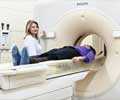Nearly seven percent of urologic multi-detector computed tomography (MDCT) scans for hematuria result in incidental findings that may be clinically important for the patient

It is known that urologic CT scans can sometimes show incidental findings. To date, however, there has been limited information about the prevalence and characteristics of those findings. Julie Song, M.D., a radiologist with Rhode Island Hospital's department of diagnostic imaging, is the principal investigator on the study to attempt to classify these findings.
Song says, "We know that incidental findings are common at CT, but such discovery is not always beneficial to the patient. Early detection of treatable disease is desirable, but "incidentalomas" can also be problematic because they can lead to a cascade of additional exams, costs, and added patient anxiety, for many conditions that are ultimately proved to be inconsequential to patient care."
Through a retrospective study, Song and colleagues examined 1,209 CT scans performed for "hematuria" (blood in the urine). Of the 1,209 patients who had undergone MDCT urography, Song found that nearly 7 percent of the scans resulted in incidental extra-urinary findings that were considered clinically important, and warranting further investigation.
The most common incidental findings were lung nodules, aneurysms and ovarian cysts. But of these, findings that ultimately had significant impact on patient care, such as those requiring immediate medical attention occurred in only 0.9 percent and cancer was found in 0.4 percent.
She concludes, "MDCT urography is a commonly performed study for hematuria. We have shown that significant incidental findings proved to be relatively uncommon."
Advertisement
Source-Eurekalert








